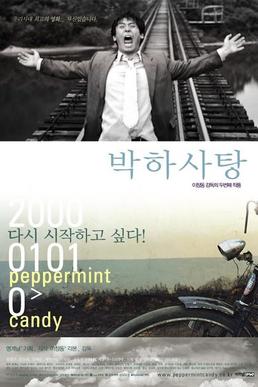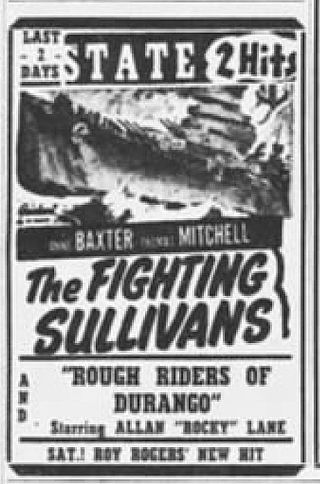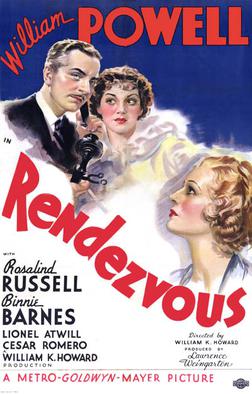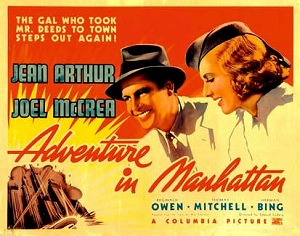Description
The film opens with a dramatic explosion of a ship by two undercover saboteurs and then fades into a written "Thoughtlessness Breeds Sabotage" message. A short vignette comes next with a sailor with his girlfriend on the telephone at a bar. As he placates her suspicions by telling her that he is sailing to Hawaii on the USS Navajo at 10:30 pm. A man with a radio disguised as a hearing aid is sitting next to him, and he sends the message to his confederates speaking in code with an enemy submarine, which blows up the ship.
Walter Huston then appears as a military instructor briefing a class about military security, and narrates a short vignette about service men in a bowling alley and how they confront a stranger asking questions about military equipment.
Probably the most powerful segment is the last, in which a woman at a grocery store, tells the grocer about her son George taking a train to the West Coast, unaware of the person standing behind her. The film fades into a newspaper room, and an editor hurriedly ordering a re-write after receiving a telephone call. When the headline is shown, it does not show the information that the woman gave out, but that 200 servicemen died in a train explosion. The women's face is shown superimposed on the newspaper saying, "No, not George!"

L'Age d'Or, commonly translated as The Golden Age or Age of Gold, is a 1930 French surrealist satirical comedy film directed by Luis Buñuel about the insanities of modern life, the hypocrisy of the sexual mores of bourgeois society, and the value system of the Catholic Church. Much of the story is told with title cards like a predominantly silent film. The screenplay is by Buñuel and Salvador Dalí. L'Age d'Or was one of the first sound films made in France, along with Miss Europe and Under the Roofs of Paris.

The Committee on Public Information (1917–1919), also known as the CPI or the Creel Committee, was an independent agency of the government of the United States under the Wilson administration created to influence public opinion to support the US in World War I, in particular, the US home front.

Lumière and Company is a 1995 anthology film made in collaboration between forty-one international film directors. The project consists of short films made by each of the filmmakers using the original Cinématographe camera invented by the Lumière brothers.

Went the Day Well? is a 1942 British war film adapted from a story by Graham Greene and directed by Alberto Cavalcanti. It was produced by Michael Balcon of Ealing Studios and served as unofficial propaganda for the war effort. The film shows a Southern English village taken over by German paratroopers, reflecting the greatest potential nightmare for the British public of the time, although the threat of German invasion had largely receded by that point. The film is notable for its unusually frank, for the time, depiction of ruthless violence.

Titanic is a 1943 German propaganda film made during World War II in Berlin by Tobis Productions for UFA, depicting the catastrophic sinking of RMS Titanic in 1912. This was the third German language dramatization of the event, following a silent film released in 1912 just four months after the sinking and the British produced German film Atlantik released in 1929.

Peppermint Candy is a 1999 South Korean tragedy film by Lee Chang-dong. The film opens with the suicide of the protagonist and uses reverse chronology to depict some of the key events of the past 20 years of his life that led to this point.

Censorship in the Soviet Union was pervasive and strictly enforced.
Return to Guam is a 1944 short propaganda film produced by the US Navy about the taking and recapture of the island of Guam.
Supervising Women Workers was a short social guidance film produced by the US Office of Education and aimed at male foremen who now had to supervise women for war work.

The Fighting Sullivans, originally released as The Sullivans, is a 1944 American biographical war film directed by Lloyd Bacon and written by Edward Doherty, Mary C. McCall Jr., and Jules Schermer. It was nominated for a now-discontinued Academy Award for Best Story.

Freedom Comes High is a 1944 dramatic short film commissioned by the United States Government during World War II and directed by Lewis Allen.

Britain re-created the World War I Ministry of Information for the duration of World War II to generate propaganda to influence the population towards support for the war effort. A wide range of media was employed aimed at local and overseas audiences. Traditional forms such as newspapers and posters were joined by new media including cinema (film), newsreels and radio. A wide range of themes were addressed, fostering hostility to the enemy, support for allies, and specific pro war projects such as conserving metal and growing vegetables.

The Spanish–American War is considered to be both a turning point in the history of propaganda and the beginning of the practice of yellow journalism.

Rendezvous is a 1935 American spy film set in World War I, directed by William K. Howard, starring William Powell and Rosalind Russell and featuring Binnie Barnes, Lionel Atwill, Cesar Romero and Samuel S. Hinds. Powell plays an American cryptologist who tangles with German spies while falling in love.

A Victim of the Mormons is a 1911 Danish silent drama film directed by August Blom. The film was controversial for demonizing the Mormon religion, and its box-office success is cited for initiating a decade of anti-Mormon propaganda films in America. It tells the story of an attractive young woman who is seduced and kidnapped by a Mormon missionary, then forced to accompany him to Utah to become one of his wives. The film became a hit, partly due to the popularity of its star, Valdemar Psilander, and partly due to the publicity arising from objections by the Church of Jesus Christ of Latter-day Saints and its failed campaign to ban the film.

Deadly Strangers is a 1975 British psychological thriller film directed by Sidney Hayers and starring Hayley Mills, Simon Ward and Sterling Hayden. It was written by Philip Levene.

Adventure in Manhattan is a 1936 American screwball comedy thriller film directed by Edward Ludwig and starring Jean Arthur and Joel McCrea. The screenplay was written by Sidney Buchman, Harry Sauber, Jack Kirkland, and John Howard Lawson. The story was written by Joseph Krumgold, suggested by the novel Purple and Fine Linen by May Edginton. The supporting cast features Reginald Owen and Thomas Mitchell, and the film was a Columbia Pictures production.
Rocket-Bye Baby is a 1956 Warner Bros. animated cartoon in the Merrie Melodies series, directed by Chuck Jones. The short was released on August 4, 1956.
World War II changed the possibilities for animation. Prior to the war, animation was mostly seen as a form of family entertainment. The attack on Pearl Harbor was a turning point in its utility. On December 8, 1941, the United States Army began working with Walt Disney at his studio, stationing Military personnel there for the duration of the war. The Army and Disney set about making various types of films for several different audiences. Most films meant for the public included some type of propaganda, while films for the troops included training and education about a given topic.

The RMS Lusitania was a British-registered ocean liner that was torpedoed by an Imperial German Navy U-boat during the First World War on 7 May 1915, about 11 nautical miles off the Old Head of Kinsale, Ireland. The attack took place in the declared maritime war-zone around the UK, three months after unrestricted submarine warfare against the ships of the United Kingdom had been announced by Germany following the Allied powers' implementation of a naval blockade against it and the other Central Powers.
















